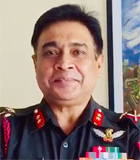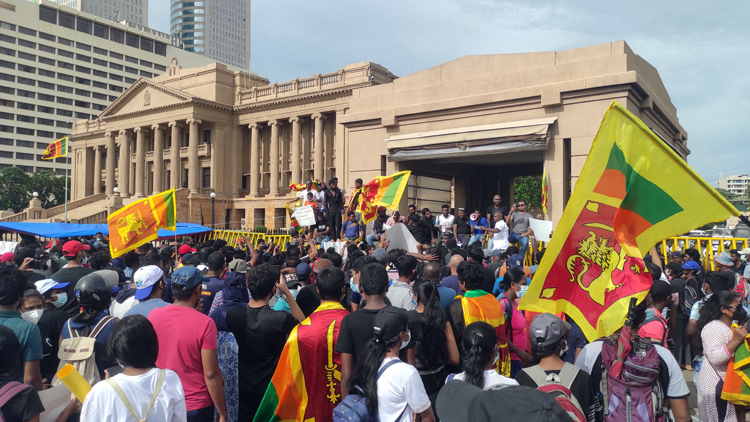INDIAN ARMED FORCES CHIEFS ON OUR RELENTLESS AND FOCUSED PUBLISHING EFFORTS

The insightful articles, inspiring narrations and analytical perspectives presented by the Editorial Team, establish an alluring connect with the reader. My compliments and best wishes to SP Guide Publications.

"Over the past 60 years, the growth of SP Guide Publications has mirrored the rising stature of Indian Navy. Its well-researched and informative magazines on Defence and Aerospace sector have served to shape an educated opinion of our military personnel, policy makers and the public alike. I wish SP's Publication team continued success, fair winds and following seas in all future endeavour!"

Since, its inception in 1964, SP Guide Publications has consistently demonstrated commitment to high-quality journalism in the aerospace and defence sectors, earning a well-deserved reputation as Asia's largest media house in this domain. I wish SP Guide Publications continued success in its pursuit of excellence.
- MoD initiates comprehensive review of Defence Acquisition Procedure 2020, pushes for defence reforms
- G7: The Swansong
- Kalinga Connect: South Asia to Polynesia
- Must Credit DRDO for Operation Sindoor, now what is next for defence R&D?
- The layered Air Defence systems that worked superbly, the key element of Operation Sindoor
- Operation Sindoor | Day 2 DGMOs Briefing
- Operation Sindoor: Resolute yet Restrained
Leaderless Not Rudderless
The 'Janatha Aragalaya' or people's struggle that booted out the Rajapakse's does not have a distinct leadership but has exhibited a distinct direction. The Aragalaya has remained to a great extent, a movement launched by a combination of a large number of youth groups which are independent of party politics.
 |
The Author is former Chief of Staff of a frontline Corps in the North East and a former helicopter pilot. He earlier headed the China & neighbourhood desk at the Defence Intelligence Agency. He retired in July 2020 and held the appointment of Addl DG Information Systems at Army HQ. |

Gota is gone, finally. The embattled Sri Lanka's President Gotabaya Rajapaksa sent his resignation letter last Thursday by email from Singapore having fled the country to the Maldives first by a Sri Lankan military aircraft before appearing in Singapore. The crowds at the tranquil beachfront which has been a protest site outside the President's office having become a tented village called "Go Gota Gama" (gama means village in Sinhala language) are celebrating. The Presidential palace has been vacated by the crowd and is now watched over by the military in combat fatigues. The army has warned the citizens not to resort to violence.
In terms of forced regime change, it is as tectonic for Sri Lanka as the "Arab Spring" was for a swathe of Arab countries over a decade back. The Arab Spring, unrelenting and often violent, had spread far and wide in the Middle East, throwing out long serving despotic regimes of Ali Abdullah Saleh of Yemen, Abidine Ben Ali of Tunisia, Hosni Mubarak of Egypt and saw the brutal killing of Libya's Muammar Ghaddafi by rampaging mobs. Many monarchies including Saudi Arabia, Jordan, Oman, Bahrain and Kuwait were forced to bring in substantial reforms to give space to the voice of the people.
Hope was in the air, hope that the Middle East will finally usher in liberal, rule-of-law governments responsive to the people and change the medieval way some of the monarchies ruled over their subjects. But the inherited structures and social compacts ensued counter-revolutions. Sectarian and tribal wars often fanned by the powerful clergy is causing more disruptions in these countries saddled with dysfunctional governing structures. The complete chaos from the disruptions in global supply chains as a consequence of western sanctions since the war erupted in Ukraine has sapped any interest from the outlier powers from actively engaging in the region. So how will it be in Sri Lanka?
In terms of forced regime change, it is as tectonic for Sri Lanka as the "Arab Spring" was for a swathe of Arab countries over a decade back
The staggering visual of tens of thousands breaching the high, iron gates of Sri Lanka's heavily guarded Presidential secretariat and residence on July 09, 2022 to unseat its most powerful politician is still fresh in everyone's mind. Gotabaya had left the palace the previous night in to the safe premises of the armed forces. Three days later he would escape to Maldives by a AN-32 air force transport aircraft and then on to Singapore the next day to email his resignation. The curtains have come down on the most powerful family of Sri Lanka. Or have they?
One thing stands out in this turmoil that has forced out, what was seen to be, the most powerful family with a stranglehold over the island nation of 22 million people. It has made and been able to maintain a distinction between what is public property and what is private, built ostensibly through loot of public money. Damage to public property has been surprisingly minimal though the private properties of the Rajapakse's and Ranil Wickremasinghe have been burnt down to ashes. As protestors hooted away, the entire ancestral farm house of ex-PM Mahinda and Gotabaya Rajapaksa in Medamulana in Hambantota city was burning to ashes, complete with a garage full of the most expensive cars. Several properties of ministers and lawmakers of the ruling coalition were destroyed by the protesters.
The Lankan diaspora abroad have gone a step ahead and started to systematically name and shame the children of powerful politicians and bureaucrats who lead flashy lifestyles in opulent properties in London, Dubai and other safe heavens procured from looting the treasury.
The country seems devoid of any functional authority other than the army. The parliament elected Prime Minister and acting President Ranil Wickremasinghe as the new President on July 20, 2022. This is the same parliament which was elected in August 2020 in elections that allowed the influential family to consolidate power for the next five years. Ranil Wickremasinghe is not the popular choice of the people of Sri Lanka and demonstrations have again erupted against his election leading to a crackdown by the Army. The Sri Lanka People's Party (SLPP) led by Mahinda and Gotabaya Rajapaksa had registered a landslide victory securing two-thirds majority in Parliament needed to amend the Constitution to further consolidate the powerful Rajapaksa family's grip on power. Ten months before, younger brother Gotabaya had swept to power in November 2019 as the executive President riding on a divisive but populist wave of Buddhist consolidation backed by a section of monks. The swearing in of the PM had taken place at a centuries-old Buddhist temple, firmly stamping the divide.
In appointing a national-level political group to find a solution to the crisis Sri Lanka is facing, it will be necessary to devise a constitutional methodology to give an appropriate representation to the restive youth across the sectarian divide
In this backdrop, any leadership that is thrown up by the current parliament is unlikely to get the support and approval of the 'Janatha Aragalaya'. The legitimacy of a bunch of politicians who collectively failed the nation leading to its tragic bankruptcy can hardly be expected to throw up an honest, resilient and trustworthy leadership that can steer the country out of the choppy waters.
The 'Janatha Aragalaya' or people's struggle that booted out the Rajapakse's does not have a distinct leadership but has exhibited a distinct direction. In protecting public property unlike in India where public transport is the first thing that is burnt down by any mob protesting on any issue, the Presidential palace was stormed but not looted or burnt down. The Aragalaya remained to a great extent, as a movement launched by a combination of a large number of youth groups which are independent of party politics. It is leaderless but not rudderless.
In appointing a national-level political group to find a solution to the crisis Sri Lanka is facing, it will be necessary to devise a constitutional methodology to give an appropriate representation to the restive youth across the sectarian divide. The disaffected Tamils in the North, and the minority Christians and Muslims must get their voices heard for Sri Lanka to be able to rebuild the country together with the Buddhist majority. Otherwise, the fear is that it may go the Arab Spring way, a wasted opportunity.
Sri Lanka is not only India's outback in the geostrategic sense but an intrinsic part of our history, culture, civilisation and folklore.





